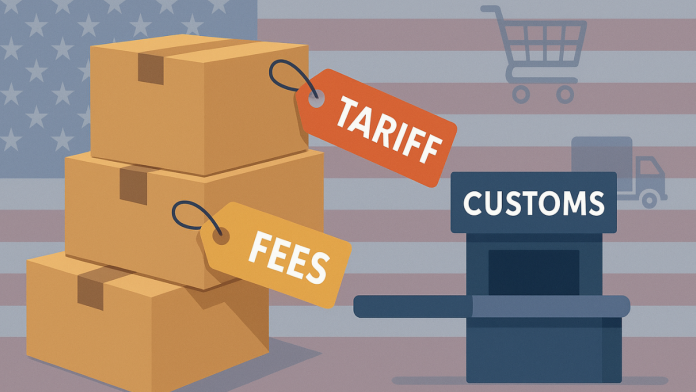For many years, Americans buying goods from overseas enjoyed a special rule called the “de minimis exemption”. This rule allowed small packages coming into the United States to avoid paying customs duties if their value was $800 or less. It was designed decades ago to save time and money since collecting small amounts of tax was seen as inefficient.
Over time, the rise of online shopping turned this rule into a huge benefit for buyers. Millions of items from clothing, shoes, and gadgets to books and craft supplies entered the country each day without extra fees. According to US Customs, nearly 1.4 billion packages worth over $60 billion entered the US last year using this rule.
Large online retailers like Shein and Temu, along with small businesses worldwide, relied on the exemption to keep costs low. Even everyday shoppers who ordered a $10 item from abroad benefited. But the exemption also became controversial. Critics argued it was abused by some companies and even used to smuggle illegal goods. Both past and present US administrations said it hurt American businesses and needed to end.
Trump’s trade adviser Peter Navarro defended the change, saying it would save lives by reducing the flow of narcotics through mail channels and add billions of dollars a year to US revenue.
What Changes from Now
Starting this Friday, imports valued at $800 or less will no longer enter the country duty-free. Every package will now face customs checks and fees. Shoppers who are used to paying only the product price and shipping cost will now see added tariffs.
Trump tariffs hailed as a debt-busting weapon that could slash US deficits by $4 trillion
The government has put two systems in place. With proper paperwork, packages will be charged according to tariff rates tied to the country of origin. Countries with low tariff rates, such as the UK and Australia, will face smaller charges, while countries like Brazil and India will face much higher ones.
For sellers or shippers without the required paperwork, there is a temporary alternative. They can pay a fixed fee between $80 and $200 per package. This option will only last for six months, after which full customs processing will be required.
Notably, personal letters and gifts worth under $100 remain duty-free. But for regular shopping, even a small item like a $20 accessory ordered from overseas may now attract fees that make it much more expensive.
This rule change is massive because more than 90% of all packages entering the US fell under the de minimis category. With its suspension, millions of shipments will now go through customs, causing delays, higher costs, and added paperwork for sellers.
How Shoppers and Businesses Are Affected
The immediate impact is expected to be felt by both small businesses and shoppers. Many overseas sellers are pausing shipments of packages to the US because they need more time to understand the new customs process. Major postal services in Europe and Asia have already suspended deliveries, citing uncertainty and lack of preparation time.
Trump warns China over magnets, threatens 200% tariff if supply is curbed
For US consumers, this means fewer product choices on international websites and longer waiting times for delivery. Many niche items that were only available from sellers abroad, such as rare collectibles or specialty craft materials, may become harder or more expensive to buy.
Smaller businesses overseas, which often relied on sending single packages directly to American customers, are hit the hardest. Tam Nguyen, from logistics firm GOL Solution, explained that sellers now must list the source of all materials in each product, slowing down shipments and increasing complexity.
Prices are also expected to rise. Businesses must now add customs duties and higher shipping costs to the final price. UK-based Wool Warehouse, which exports crafting materials to the US, has already paused orders and expects prices to increase by up to 15%.
Even larger retailers are not immune. Tapestry, the parent company of Coach, has warned of a $160 million hit to its profits, with about one-third of that linked to the end of the de minimis rule. Meanwhile, Gap Inc. welcomed the move, saying it would level the playing field by preventing some importers from avoiding duties.
Trade expert Deborah Elms noted that smaller firms in particular will struggle, as the costly audits required to clear customs make it harder to keep prices stable. Sellers may need to rely on express couriers, which are more expensive, just to reach American buyers.
While large US-based retailers may benefit as shoppers turn to stores like Walmart and Target for cheaper alternatives, the suspension of the duty-free exemption means higher costs, longer waits, and fewer choices for millions of American consumers.


